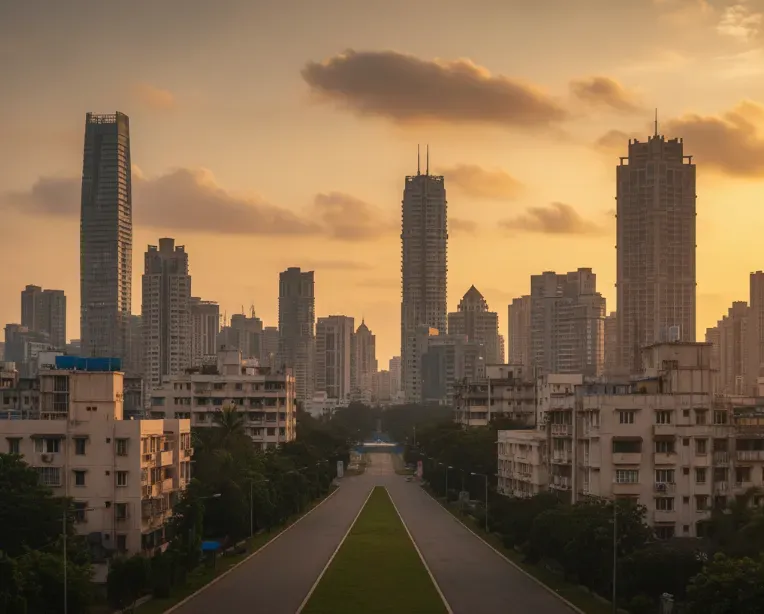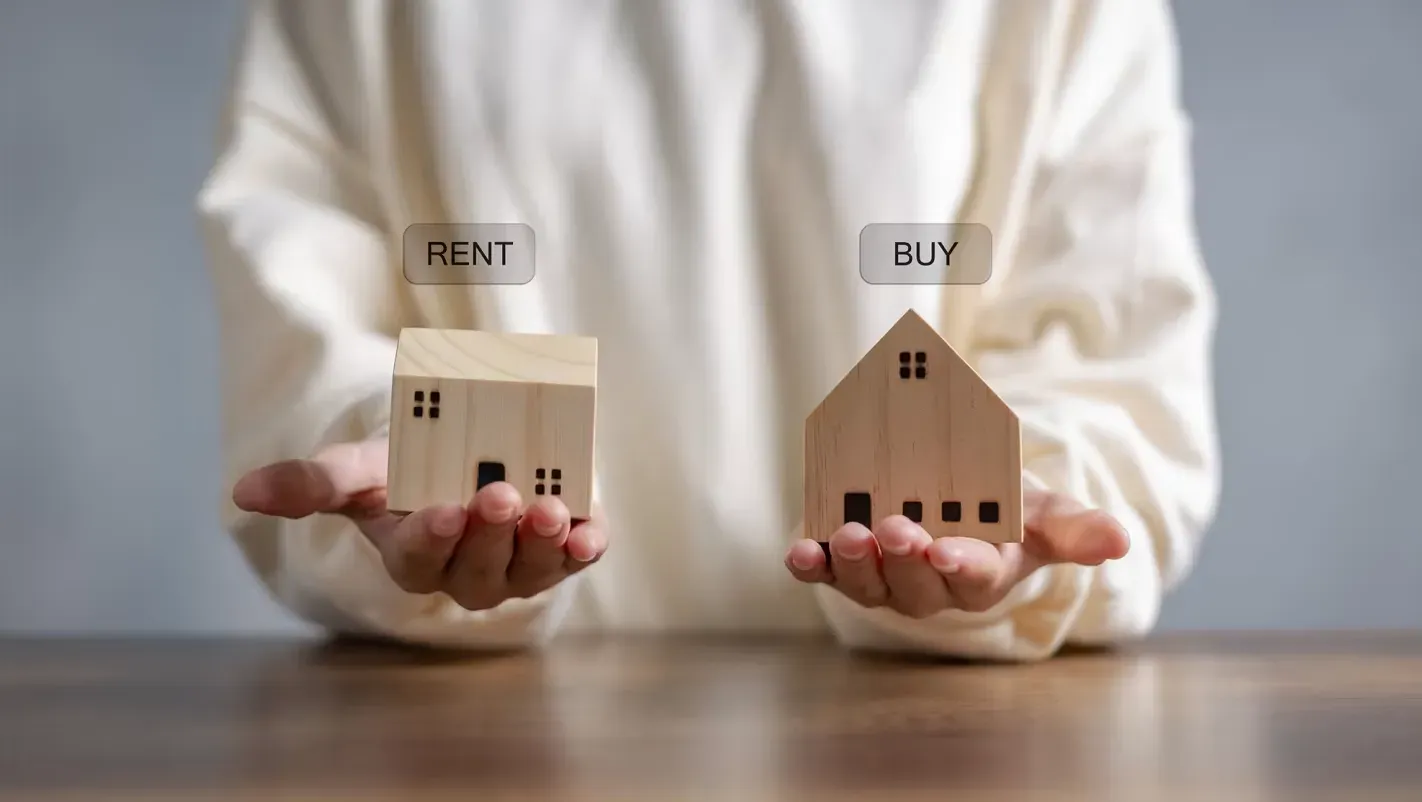Renting vs Buying a 1BHK in Mumbai 2025 – Smart Choice Guide

By
Shrusti Naik
Posted on September 25, 2025. 10 mins

Italic# Introduction

When planning to live in Mumbai, one of the most recurring dilemmas for professionals, students, and families alike is: Should I rent or buy a 1 BHK flat? The choice isn’t trivial. In 2025, soaring real estate prices, rising rents, interest rates, and lifestyle mobility all play a role in this decision. This article presents a detailed, India-grounded analysis of renting vs buying a 1 BHK in Mumbai in 2025. We compare costs, risks, benefits, break-even timelines, and help you decide which option may suit your circumstances. Before you move ahead, check out If It's Worth Buying a 1BHK in Mumbai in 2025, or Should you Wait?
1. Mumbai Market Snapshot: 1 BHK Prices & Rents (2025)
1.1 Price Ranges for 1 BHK in Mumbai
- According to Housing.com, 1 BHK flats in Borivali East currently list for ₹ 80 lakhs to ₹ 90.5 lakhs, with per-sq-ft prices in the ₹ 21,900–₹ 24,100 range.
- In more premium suburbs or mid-Mumbai, 1 BHK prices can exceed ₹ 1 crore. Hindustan Times recently noted that “entry-level 1 BHK apartments start at around ₹ 1 crore” in many parts of Mumbai.
- On the lower end (outer suburbs / fringe), one sees listings from ₹ 60 lakhs upward. Housivity’s 2025 report suggests 1 BHK flats start at ~₹ 60 lakh in suburban pockets and go up to ₹ 1.5 crore in premium zones.
- In places like Panvel (on Navi Mumbai fringe), average 1 BHK prices are ~₹ 45.7 lakhs.
Thus, a plausible price band in 2025 for 1 BHK in Mumbai (various zones) is ₹ 60 lakhs to ₹ 1+ crore.
1.2 Rent Levels for 1 BHK
- 99acres lists 1 BHK units for rent in Kandivali East at ~ ₹ 33,000 / month for ~428 sq ft flats.
- In some localities like Goregaon West, older 1 BHKs are reportedly commanding ₹ 42,000 / month or more, as per recent anecdotal reports.
- More broadly, NoBroker’s data suggests that rental inflation in major metros, including Mumbai, moderated in H1 2025 to ~7%–9% year-on-year. So monthly rents for a modest 1 BHK in a decent area may range from ₹ 25,000 to ₹ 45,000+ depending on locality, amenities, age, etc.
Also read, Which Areas Offer the Best Affordability and ROI in Mumbai?
2. Key Factors Influencing the Rent vs Buy Decision
Below are the principal levers you must analyze for your personal decision.
| Factor | Renting Advantage | Buying Advantage / Risk |
|---|---|---|
| Upfront cost & liquidity | Low: security deposit + first month’s rent | High: down payment, stamp duty, registration, brokerage, maintenance |
| Monthly outgo | Rent (subject to annual hikes) | EMI + maintenance + property taxes |
| Flexibility / mobility | High – less commitment, easier to shift | Lower – harder to liquidate or rent out |
| Asset & appreciation | None | You gain equity + potential price appreciation |
| Tax incentives | HRA deduction (if salaried) | Interest deduction under Section 24 and principal under 80C |
| Maintenance responsibility | Mostly landlord’s | Owner’s burden (repairs, structural costs) |
| Risk exposure | Rental inflation, eviction risk | Market risk, interest rate volatility, illiquidity |
Also check out, The Ins and Outs of Property Management for Landlords: Maximizing Your Rental Income
3. Cost & Break-Even Analysis
Let’s run a simplified example to compare renting vs buying.
Scenario Assumptions
- Property price (1 BHK in a mid suburb): ₹ 80 lakhs
- Down payment: 20% → ₹ 16 lakhs
- Loan amount: ₹ 64 lakhs
- Home loan interest: ~8.5% p.a.
- Tenure: 20 years
- Monthly EMI (estimate): ~₹ 55,000 (as some examples show) ([JSB Homemakers][8])
- Monthly rent for similar flat: ₹ 35,000
- Annual rent escalation: 7%
- Annual property value appreciation: 6%
Cash Flow Comparison Over Time (Indicative)
| Year | Rent Paid Cumulative | Equivalent Ownership Cost (EMI + down payment) | Value of Property / Equity |
|---|---|---|---|
| 1 | ₹ 4.2 lakhs (₹ 35,000 ×12) | EMI ₹ 6.6 lakhs + down payment ₹ 16 lakhs | You own a ₹ 84.8 lakh asset (6% appreciation) minus interest component |
| 5 | ~₹ 23 lakhs (rising rent) | EMI outgo ~₹ 33 lakhs + DP | Property value ~₹ 1.07 crore, equity built |
| 10 | Rent paid ~₹ 68 lakhs | EMI outgo ~₹ 82 lakhs + DP | Value ~₹ 1.43 crore, strong equity |
| 20 | Rent paid ~₹ 2.3 crores (with escalations) | EMI outgo ~₹ 1.98 crores + DP | Final value ~₹ 2.85 crores, you fully own |
Interpretation: Over long horizon, buying tends to “pay itself” because rent outflows accumulate, whereas equity and price appreciation give benefits. But the break-even point may arrive only after many years, for some buyers, that may be 7–10+ years depending on rates, appreciation, and rent growth.
You may want to check Understanding Real Estate Taxes
4. When Renting Makes More Sense (2025 Mumbai Context)
You might prefer renting if:
- You are uncertain about staying in Mumbai long-term (job changes, relocation).
- You lack sufficient down payment or prefer liquidity over tying up capital.
- You expect property prices in your area to stagnate or fall (less upside).
- You want to avoid maintenance, structural repair burden.
- You prefer to invest surplus capital elsewhere (stocks, business) with possibly higher returns.
- You anticipate rent escalation lower than returns from alternative investments.
Given that rental inflation in Mumbai is still rising (7–9% in H1 2025), your rent burden will climb. But owning brings interest rate risk and locking in capital.
5. When Buying Is Likely the Better Option
Buying a 1 BHK may make sense when:
- You plan to stay for 8–10+ years in Mumbai.
- You can afford the down payment and closing costs without distress.
- You expect property value appreciation (e.g. near upcoming infrastructure).
- You benefit from home loan tax deductions: interest under Section 24 and principal under 80C.
- You prefer control, customization of space, and security from rent hikes or eviction.
- You can absorb maintenance and other ownership costs.
In mid/long run, given home prices in Indian metros are expected to rise faster than inflation (as per a Reuters poll: ~6.5% in 2025) and rents forecast to rise 7–10%, owning has built-in inflation hedge advantages.
6. Sensitivity & Key Variables to Watch
- Interest rates / home loan spreads: A rise in rates significantly raises EMI cost.
- Price appreciation: If your area sees strong infrastructure-led growth, your gains improve.
- Rent escalation: If rent rises sharply, the cost of renting accelerates.
- Maintenance & property tax: In Mumbai, these may be non-trivial over decades.
- Opportunity cost: Capital used in down payment could yield returns elsewhere.
- Liquidity risk: Selling a home in a downturn may take time.
Thus, each buyer should run scenario simulations (e.g. EMI vs rent growth vs appreciation) for their area (Andheri, Borivali, Navi Mumbai, etc.)
7. Mumbai Zones & What Makes Practical Sense
- In outer suburbs (e.g., Vasai, Mira Road, Panvel), the price gap between renting and buying narrows. If your cost of buying is lower (say ₹ 60–70 lakhs with modest commute), buying might be more attractive.
- In mid suburbs / well-connected localities (Andheri, Borivali, Goregaon), buying makes sense only if you foresee staying long enough and value appreciation.
- In prime localities (Bandra, South Mumbai), prices are prohibitively high; renting may remain the more rational option for many.
- Near infrastructure corridors (metro, upcoming roads), buying early can yield capital gains.
Also read, What the RBI Repo Rate Cut Means for Homebuyers: EMIs Just Got Cheaper
Conclusion & Practical Takeaways

- In Mumbai 2025, 1 BHK prices tend to lie in ₹ 60 lakhs to ₹ 1+ crore and rents in ₹ 25,000 to ₹ 45,000+ per month depending on area.
- Over long durations (8–10+ years), buying tends to build equity and hedge inflation; renting has shorter-term flexibility and lower upfront cost.
- The break-even horizon depends heavily on interest rates, rent escalation, property appreciation, and your mobility.
- Use scenario modeling for your specific preferred area(s).
- If you plan to stay long, have matched finances, and believe in property appreciation, buying is often more sensible. If uncertainty or liquidity is your priority, renting remains a strong choice.
For those in pursuit of their dream home, investment opportunities, or a sanctuary to call their own, Jugyah provides top housing solutions with its intelligent technology.
Frequently Asked Questions
-
If I get a home loan for a 1 BHK in Mumbai, how much tax benefit can I claim? You can claim interest paid (up to ₹2 lakh) under Section 24(b) and principal repayment under 80C (up to ₹1.5 lakh) as long as the property is self-occupied or its rent is declared.
-
How many years must I stay in a home for buying to be better than renting? Typically, 7–10 years is a common estimate for break-even, though in high-appreciation localities it may happen sooner.
-
Can I claim HRA tax benefit while renting and simultaneously invest in a home? Yes, if you are salaried and rent a house, you may claim HRA deduction (subject to conditions) even if you own another house, provided you do not reside in the owned one.
-
What happens if interest rates rise midway through my home loan? For floating rate loans, your EMI or tenure will be adjusted upward. It adds risk — you should maintain a buffer in your income capacity.
-
If I decide to sell my 1 BHK, how long does sale and transfer take in Mumbai? The sale process (finding buyer, legal checks, registration) can take 3–6 months depending on market conditions and paperwork readiness.